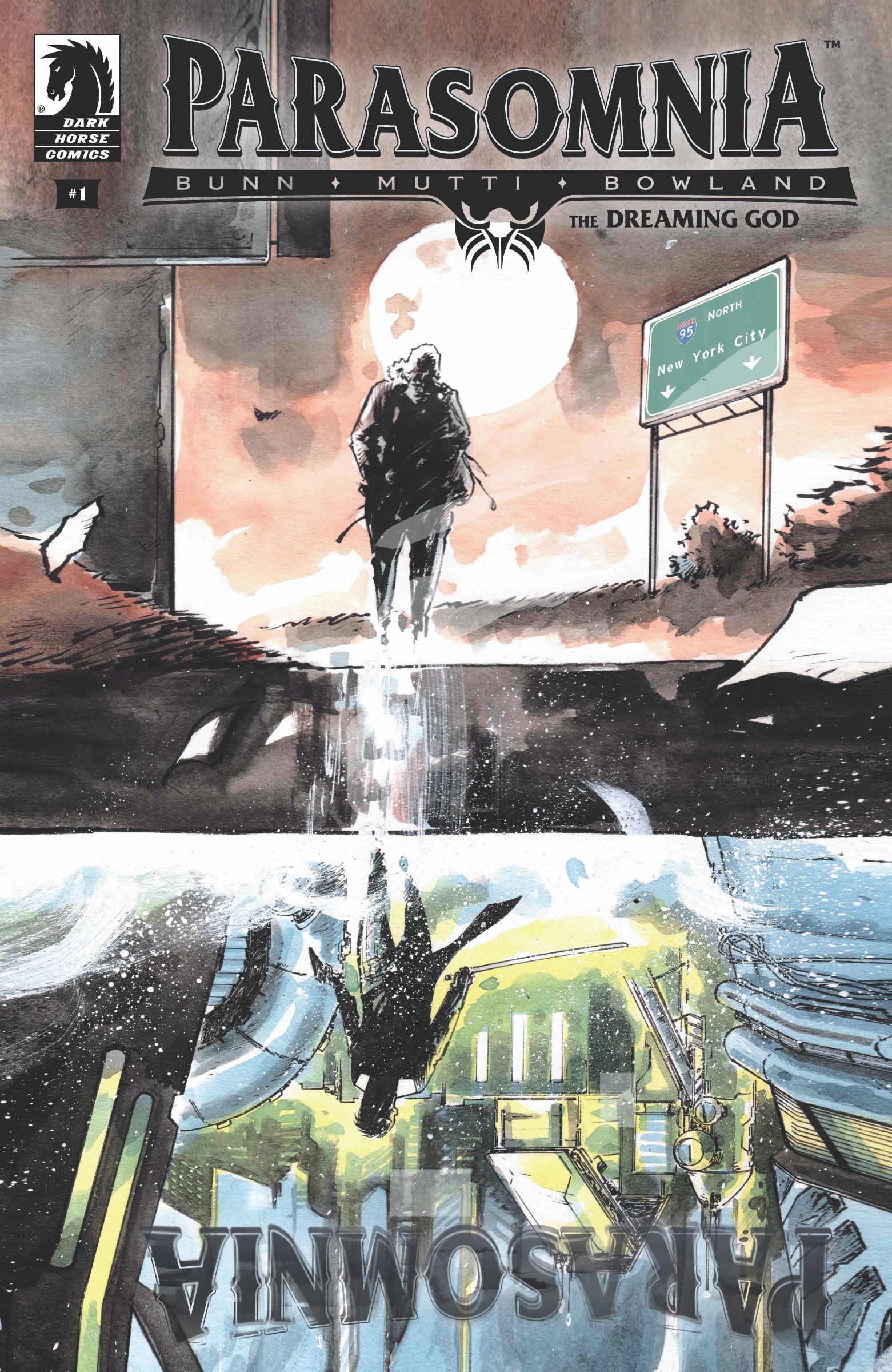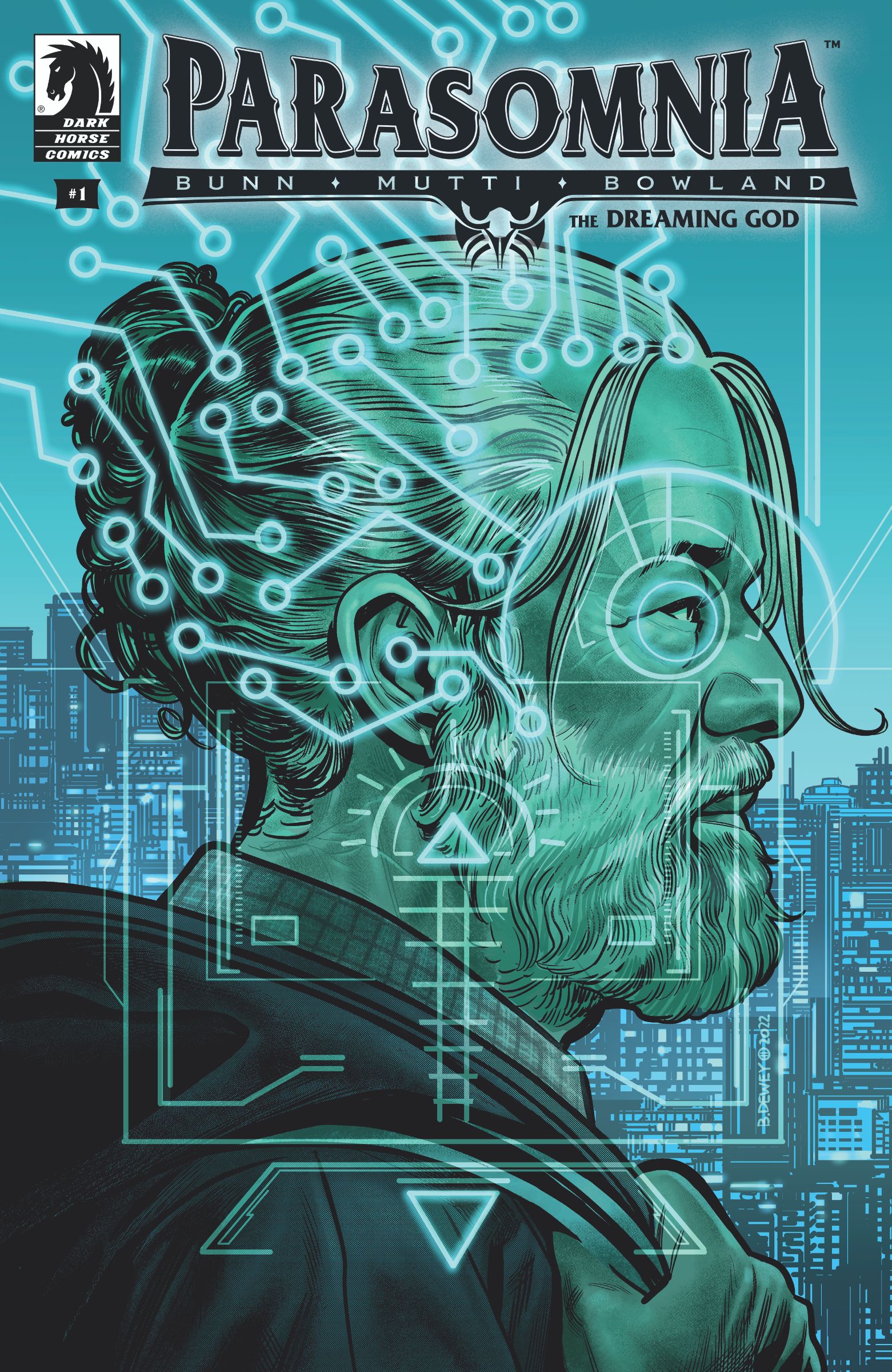Prolific author Cullen Bunn is preparing to have a busy summer. Between his work on Valiant Comics' upcoming Book of Shadows and his Godzilla vs. The Mighty Morphin Power Rangers series with IDW and BOOM! Studios, fans will have plenty of opportunities to read his comics in the coming months. On top of all that, Bunn is reuniting with artist Andrea Mutti to revisit the world of their series Parasomnia. The four-issue miniseries Parasomnia: The Dreaming God, is due to be released by Dark Horse Comics on Wednesday, August 17.
Parasomnia: The Dreaming God will continue to follow the nameless hero from the first series as he explores a surreal dreamscape in search of his missing son. The fantasy world of the first series has been replaced by a cyberpunk dystopia, where a villainous software company called Damocles Worldwide seeks to gain power. CBR recently spoke with Bunn about his experience revisiting the series, his collaboration with Mutti, and his appreciation of cyberpunk as a genre.
CBR: Has your approach to the world of Parasomnia changed heading into the new series?
Cullen Bunn: For sure! In many ways, everything about the series is changing. Half of the first series took place in the realm of dreams, after all. If there's one thing we know about dreams, [it is that] they're ever-changing. One second, you find yourself in a 17th Century forest, [and] the next, you're in a dystopian cyberpunk future. Starting with this series, we're really exploring the shifting nature of dreams. We're not stopping there, though. We're also exploring the shifting nature of waking reality.
What made you want to start a new series to follow up Parasomnia, rather than just continuing numerically?
Parasomnia was always conceived as a series of limited series. I think that works well considering, how the stories change from arc to arc. It is a continuing tale, but we're putting a very fine point on the idea that these are very different kinds of stories.
What made you want to change the aesthetic and tone of the dream world?
This was always the idea. I have a list of settings and genres that I want to explore under the Parasomnia banner. As you'll see in this series, the story is getting stranger and stranger, not just from series to series, but from issue to issue, and sometimes panel to panel. This is a story about desperation, hope, and the endless possibilities that surround both of those states of being. We're not holding back on shaking things up. When this series wraps up, readers will know that the stories to come are going to be even more wild.
How did you and Andrea Mutti go about designing this new aspect of the story?
I knew going into this that Andrea would be up to the challenge of just about anything I threw his way. We talked a bit about the new direction, and he sent me a few big requests in terms of things that might show up in the book. I made sure to incorporate those ideas. At the same time, I wanted him to be surprised and excited by what came his way.
How did seeing his artwork influence your writing?
From the moment we first started working together, I couldn't help but keep his style in mind with every page I wrote. I can't name a specific story element, but I know all of it was influenced by his unique take on the world, the dreams, and the characters.
Were there any particular cyberpunk stories you looked to for inspiration?
All of them? I don't know that any one cyberpunk story played a bigger role than another. I wanted this to feel like a new cyberpunk universe, something with a history and style all its own. I certainly drew inspiration from all the other books and comics I've read, all the movies I've watched, and all the pen-and-paper and video games I've played. I took that collective inspiration and tried to do something new with it.
How have your own dreams informed your work on the series?
Not so much events in specific dreams as the ways my dreams feel, the way they shift and change, the way nothing is constant, and the way, upon waking, I'm sometimes not sure what really happened and what was all in my subconscious. That last bit plays a big role in this book.
What can you tell fans about Damocles Worldwide?
Damocles Worldwide is a mega-corporation and antagonist in this series. They want our heroes to retrieve a piece of software for them -- a piece of fleshware. This software has a personality and desires all its own. It's also nearly omnipotent. Damocles would do anything to get their hands on this software, and if our heroes -- No-Name, Kahnawake, and a new hero joining the mix -- don't cooperate, they'll find themselves targets.
Can readers expect to see more of the mysterious cult in this arc?
Oh, yes. Fenny and her followers are the driving force behind this story. In this series, we'll learn a little more about their fixation on dreams. In the first series, we saw them striking in the real world. In this series, they're taking a more active role in the dreams themselves.
Parasomnia: The Dreaming God #1 is due out from Dark Horse Comics on Wednesday, August 17.




